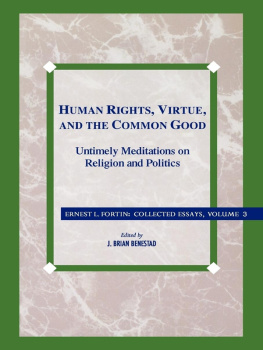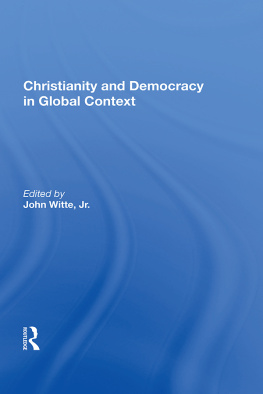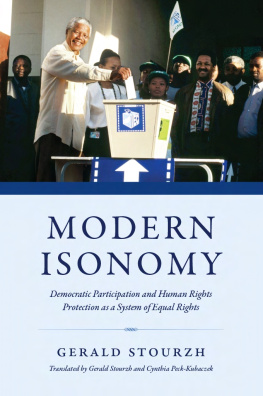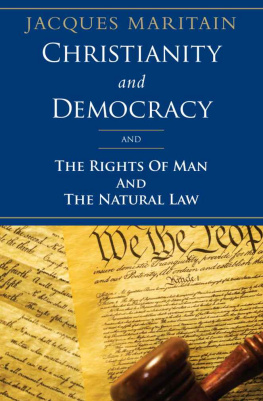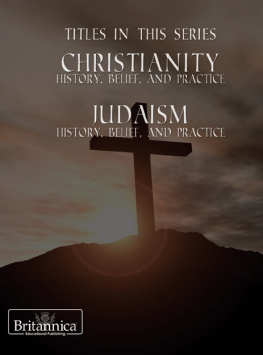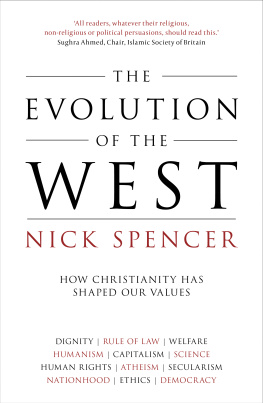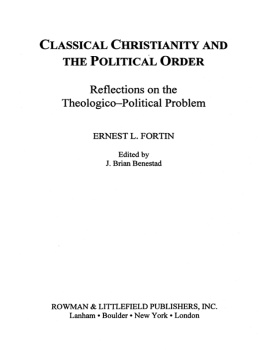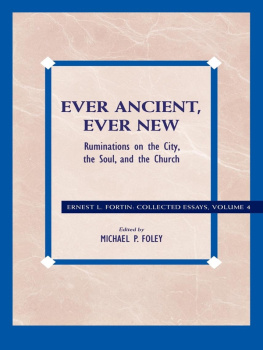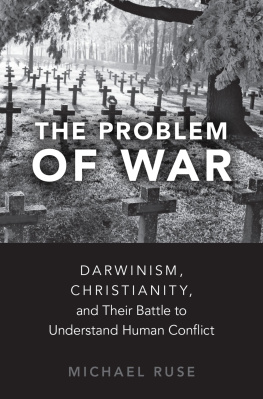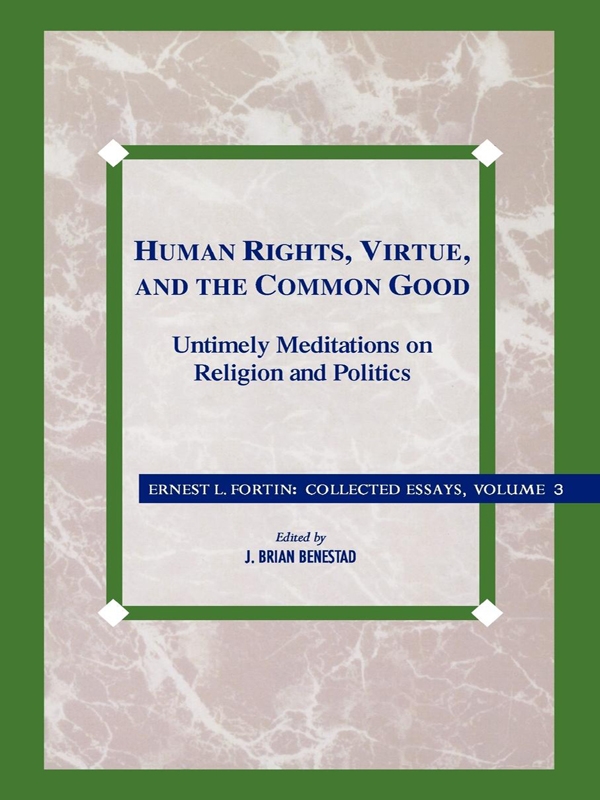ACKNOWLEDGMENTS
The author and editor wish to take this opportunity to thank all those who had a direct hand in the launching and the realization of this project, among them: Stephen F. Brown, Matthew Lamb, and Patrick J. C. Powers. Daniel J. Mahoney found the right publisher and graciously contributed the Foreword to the second volume. The idea of publishing the three volumes simultaneously and as a set belongs to Jonathan Sisk, the editor-in-chief of Rowman and Littlefield, without whose encouragement and active support the project would probably never have seen the light of day.
Invaluable assistance was provided by the editorial staff of Rowman and Littlefield and, in particular, by Julie Kirsch and Dorothy Bradley, whose expertise and endless patience won both our gratitude and our admiration. We are also grateful to Phillip Wodzinski, a doctoral student in political science at Boston College, whose research talents and proof reading skills, hitherto unknown to the world, revealed themselves to superb advantage on this occasion. Ann King, the retired secretary of the Department of Theology and Religious Studies at the University of Scranton, toiled endlessly and in a completely selfless way on virtually every page of the manuscript, at the risk of being driven out of her mind by its innumerable references to works in at least six different foreign languages, including Greek and Latin. Her dedication was paralleled by that of Shirley Gee, the omnicompetent administrative assistant of the Institute of Medieval Philosophy and Theology at Boston College. Further secretarial help was provided by Marie Gaughan, Patricia Mecadon, and Barbara Quinn, of the University of Scranton. A recent University graduate, Steven Pustay, generously offered assistance to the editor through his work on the endnotes. The staff of the Thomas ONeill Library, Boston College was always there to help whenever necessary and also deserves special mention. The author is immensely grateful for generous financial help in the form of research fellowships received from the John M. Olin Foundation, the Lynde and Harry Bradley Foundation, the National Endowment for the Humanities, and the Boston College Graduate School.
None of the articles in these three volumes could have been written without constant input from the authors colleagues and daily conversation partners in the departments of Theology, Political Science, and Philosophy at Boston College, along with friends and long-time associates in other colleges and universities here and abroad. They shall not be listed individually for fear that too many names should inadvertently be left out. If they are ever tempted to peruse these books, they will have no trouble identifying their respective contributions.
The editor is especially indebted to his colleagues at the University of Scranton, Father Richard Rousseau, S.J., and Dr. Edward Mathews, as well as to Betsy Moylan, a librarian at the University, for their expert assistance. He thanks his wife, Janet Benestad, and their daughters Katherine and Lizzie, for help with various aspects of the project. He also expresses his appreciation to the University of Scranton for grants to support the writing of his foreword and the typing of numerous articles, and to Dr. Thomas Hogan and Dr. Richard Passon for their support of the whole endeavor.
Chapter 1. The Regime of Separatism: Theoretical Considerations on the Separation of Church and State is reprinted from Modernity and Religion, edited by R. McInerny, 1994 University of Notre Dame Press, 145-165. By permission of the University ofNotre Dame Press.
Chapter 2. Human Rights and the Common Good is reprinted from the CCICA Annual 13 (1994): 1-16. By permission of the Catholic Commission on Intellectual and Cultural Affairs.
Chapter 3. Christian Education and Modern Democracy in Liberal Education and American Democracy, edited by R. Utley, forthcoming. By permission of R. Utley.
Chapter 4. Is Liberal Democracy Really Christian? is reprinted from Free Inquiry 4, no. 2 (Spring, 1984): 32-35. By permission of Free Inquiry.
Chapter 5. Do We Need Catholic Universities? is reprinted from Fellowship of Catholic Scholars Newsletter 16, no. 3 (June 1993): 2-6. By permission of Fellowship of Catholic Scholars Newsletter.
Chapter 6. Rome and the Theologians is reprinted from Crisis 9, no. 5 (May 1991): 16-20. By permission of Crisis.
Chapter 7. In the Shadow of the Gallows: Criminal Justice, Its Rationale and Its Limitations is reprinted from The World and I (March 1990): 501-15. By permission of The World and I.
Chapter 8. Augustine, the Arts, and Human Progress is reprinted from Theology and Technology: Essays in Christian Analysis & Exegesis, edited by C. Mitchum and J. Grote, 1984 University Press of America, Lanham, Maryland, 193-208. By permission of the University Press of America.
Chapter 9. Science as a Political Problem is reprinted from CCICA Annual 3 (1984): 35-41. By permission of the Catholic Commission on Intellectual and Cultural Affairs.
Chapter 10. The Bible Made Me Do It: Christianity, Science, and the Environment is reprinted from The Review of Politics 57, no. 2 (Spring 1995): 197-223. By permission of The Review of Politics.
Chapter 11. Otherworldliness and Secularization in Early Christian Thought: A Note on Blumenberg. Previously unpublished.
Chapter 12. Thoughts on Modernity is reprinted from Conditions and Purposes of the Modern University, 1965 The Catholic Commission on Intellectual and Cultural Affairs, Washington, D.C., 19-30. By permission of Catholic Commission on Intellectual and Cultural Affairs.
Chapter 13. Natural Law is reprinted from The Encyclopedia of Democracy, vol. 1, 1995 Congressional Quarterly Inc., Washington, D.C., 878-880. By permission of Congressional Quarterly, Inc.
Chapter 14. Troeltsch and Christendom. Previously unpublished.
Chapter 15. Gadamer on Strauss is reprinted from Interpretation 12, no. 1 (January 1984): 1-13. By permission of Interpretation.
Chapter 16. Sacred and Inviolable: Rerum Novarum and Natural Rights is reprinted from Theological Studies 53 (1992): 203-33. By permission of Theological Studies.
Chapter 17. From Rerum Novarum to Centesimus Annus: Continuity or Discontinuity? is reprinted from Faith and Reason 17, no. 4 (Winter 1991): 399-412. By permission of Faith and Reason.
Chapter 18. The Saga of Spiritedness: Christian Saints and Pagan Heroes. Previously unpublished.
Chapter 19. In Defense of Satan: Christian Perspectives on the Problem of Evil is reprinted from This World 25 (Spring 1989): 50-58. By permission of This World.
Chapter 20. Social Activism and the Churchs Mission is reprinted from Center Journal 1, no. 3 (Summer 1982): 33-41. The Center Journal has discontinued publication.
Chapter 21. Church Activism in the 1980s: Politics in the Guise of Religion? is reprinted from Religion and Politics, edited by F. Baumann and K. Jensen, 1989 University Press of Virginia, 33-50. By permission of the University Press of Virginia.
Chapter 22. Theological Reflections on The Challenge of Peace: Gods Promise .and Our Response, A Pastoral Letter on War and Peace (May 3, 1983) is reprinted from Catholicism in Crisis, vol. 1, no. 8 (July 1983): 9-12. By permission of Crisis.
Chapter 23. Christianity and the Just-War Theory is reprinted from Orbis 27 (1983): 523-35. By permission of Orbis.
Chapter 24. Catholic Social Teaching and the Economy: Criteria for a Pastoral Letter is reprinted from Catholicism in Crisis 3, no. 2 (January 1985): 41-44. By permission of Crisis.

